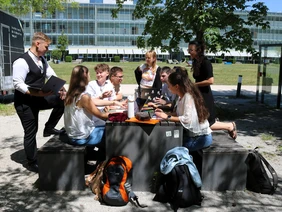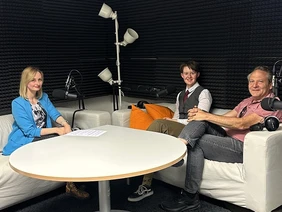Karl is standing in his kitchen, sorting through old documents. He is not clearing out because he wants to move out, but because he wants to stay. The 80-plus-year-old lives alone in a house in Gallneukirchen, Upper Austria, surrounded by forests, memories, and a clear decision: he wants to live independently for as long as possible - with dignity, a daily routine, and a cup of coffee at his own table at home.
Karl is a retired vet, a man with clear ideas. And he is more than just an elderly person with a wish. For a group of students at Ingolstadt University of Applied Sciences, he became the starting point for an award-winning project. After all, Karl is what experts call a ‘lead
user’ - someone who experiences challenges earlier than others and thus becomes a pioneer of ideas for care that are suitable for everyday use. He worked on it for over 30 years - first for his mother-in-law, then for his wife.
As part of an intensive project week during their compulsory internship, students from the Technical Design and Industrial Engineering programmes tackled key questions: How do we want to live in old age? How can care and privacy be combined without the home feeling like a hospital?
The result is a piece of furniture that is far more than just a bed - more like a room within a room. It bears the name ‘Kaiser Karl III’ - in honour of the man whose life inspired it. It was developed by an interdisciplinary team that has already been honoured by the university's sponsorship association. The bed is mobile, customisable, offers storage space, structure, and retreat, and blends unobtrusively into any home. At the same time, it is designed in such a way that it can also be used in emergency accommodation, for example, after natural disasters or in refugee situations.
For the students, the project was more than just a compulsory part of their timetable. Design student Maria Reichelt remembers: "Our professor showed us the population pyramid of Central Europe. Then we saw Karl's story - how he lives, how he thinks. Suddenly, it was no longer just a project, but something personal. I wanted to design something that could help him. Something that looks like home, not like care."
The teams were accompanied by Professor Bernhard Rothbucher, head of the Design Leadership degree programme. He had gotten to know Karl before his teaching role as head of the multi-award-winning Salzburg agency Synowaytion. For years, he has been focusing on the potential of ageing and the role of design in social issues. ‘Design means responsibility,’ he says. ‘If we succeed in creating quality of life through furniture, we show what design can do for society.’
The presentation of the finished concepts took place in front of a large audience in the university auditorium and was met with not only applause but also genuine interest. Initial talks with aid organisations are already underway. Maria's team has also been included in the final round of the Social Impact Awards Germany 2025. The pitch in front of the jury and audience will take place in Berlin in autumn.
If you would like to find out more about the background, Karl's story, and the development process, you can listen to a podcast episode now: https://www.thi.de/hochschule/aktuelles/podcast/
And Karl? He was delighted that something new could emerge from his life story. He will never lie in one of these beds. But he has helped many others to do so, with dignity, with self-determination. And with a feeling of home.



![[Translate to English:] Logo Akkreditierungsrat: Systemakkreditiert](/fileadmin/_processed_/2/8/csm_AR-Siegel_Systemakkreditierung_bc4ea3377d.webp)








![[Translate to English:] Logo IHK Ausbildungsbetrieb 2023](/fileadmin/_processed_/6/0/csm_IHK_Ausbildungsbetrieb_digital_2023_6850f47537.webp)


